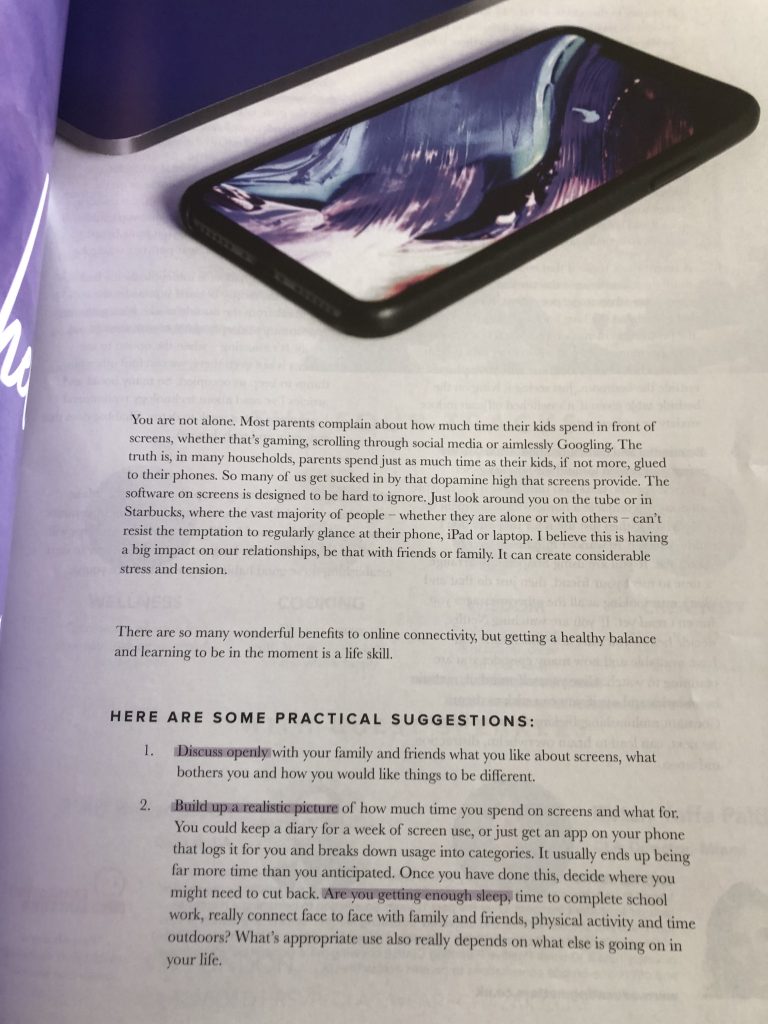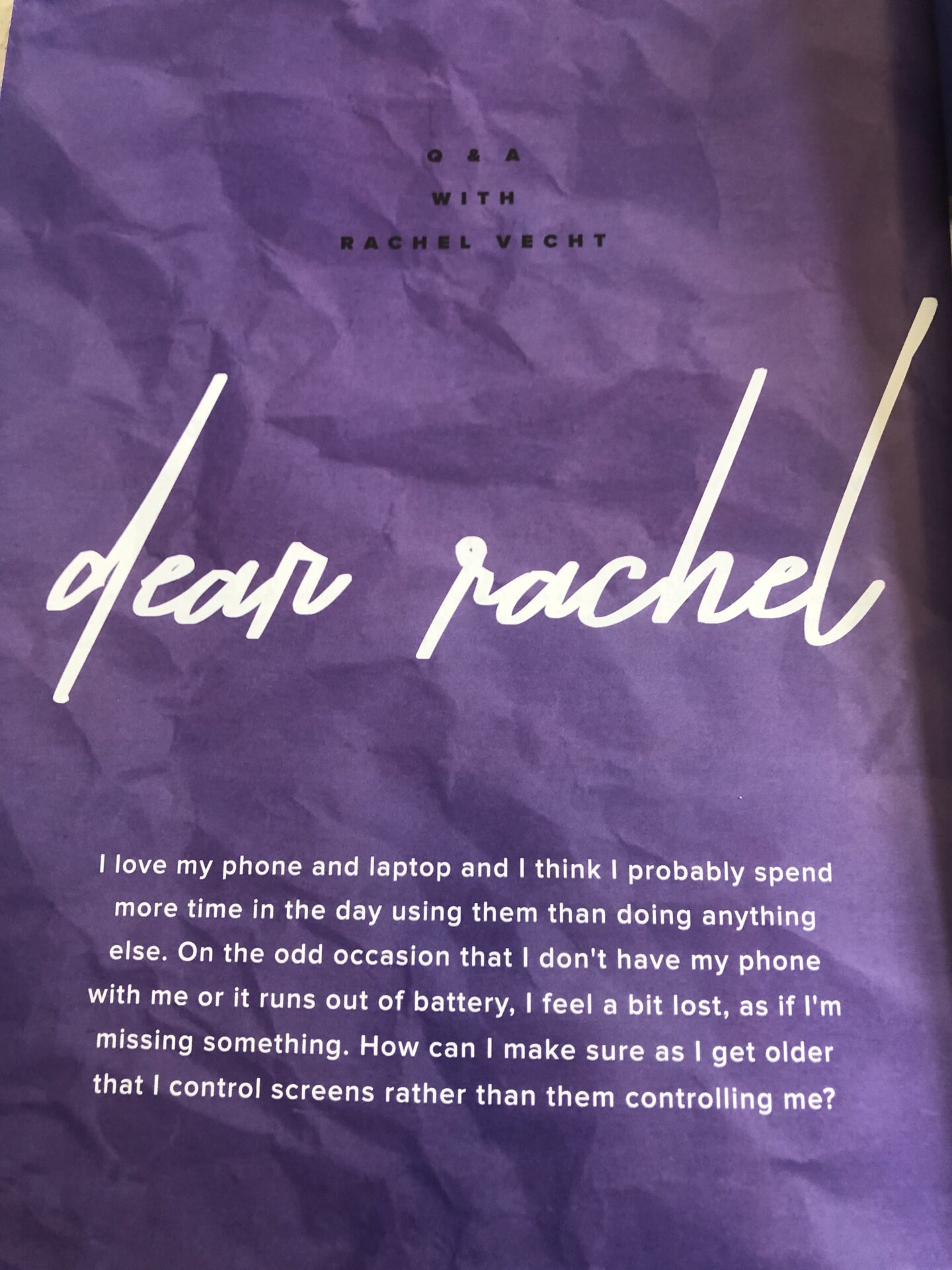I love my phone and laptop and I think I probably spend more time in the day using it than anything else. On the odd occasion when I don’t have my phone with me or it’s run out of battery, I feel a bit lost as if I’m missing something. How can I make sure as I get older that I control screens rather than them controlling me?

You are not alone. Most parents complain about how much time their kids spend in front of screens whether that’s gaming, scrolling through social media or aimlessly googling. The truth is in many households, parents spend just as much time as their kids, if not more, glued to their phones. So many of us get sucked in by that dopamine high that screens provide. The software on screens is designed to be hard to ignore. Just look around you on the tube or in Starbucks, where the vast majority of people whether they are alone or with others can’t resist the temptation to regularly glance at their phone, iPad or laptop. I believe this is having a big impact on our relationships, be that with friends or family. It can create considerable stress and tension.
There are so many wonderful benefits to online connectivity but getting a healthy balance and learning to be in the moment is a life skill.
Here are some practical suggestions:
- Discuss openly with your family and friends, what you like about screens, what bothers you and how you would like things to be different.
- Build up a realistic picture of how much time you spend on screens and what for. You could keep a diary for a week of screen use or just get an app on your phone that logs it for you and breaks usage down into categories. It usually ends up being far more time than you anticipated. Once you have done this, decide where you might need to cut back. Are you getting enough sleep, time to complete school work, really connect face to face with family and friends, physical activity and time outdoors? What’s appropriate use also really depends on what else is going on in your life. If you are in the midst of GCSEs and need to focus on revision, that’s quite different to the middle of the summer holidays when there is far more time available.
- Making small changes is so much easier when you enlist the help of others. Set some clear boundaries at home as a family. You could potentially be a good role model to your parents!! For example, establish screen free zones: no phones during a family meal, in bedrooms at night or in the car. Don’t be embarrassed to suggest the same thing to your friends. How often do you gather together at someone’s house or go out for a meal and spend time looking at your phones, as opposed to actually talking to each other?
- A recent study showed that teenagers who spend more than four hours a day on screens were 3.5 times more likely to get poor sleep. It’s been well publicised that the blue back light interferes with the production of melatonin, which is a natural sleep hormone. Agree as a family to switch off at least 1 hour before bedtime and leave phones outside the bedroom. Just seeing it lying on the bedside table (even if it’s switched off), can induce anxiety or excitement.
- Be mindful and conscious about what you are using your screen for and for how long. Set yourself specific tasks and time slots. If it’s to write an essay or complete a homework assignment on ‘My Maths’ then just use it for that and don’t allow yourself to wander mindlessly over to YouTube. If you are using Snapchat to arrange a time to meet your friend, then just do that and don’t start looking at all the other messages you haven’t read yet. If you are watching Netflix, decide before you start how much time you have available and how many episodes you are planning to watch. Give yourself mindful, realistic boundaries and see if you can stick to them. Constant multitasking, flicking from one thing to the next, can lead to brain overwhelm, distraction and stress.
- Pouring over screens can give you a headache, sore eyes, back ache, affect focus, concentration and give a feeling of tension and anxiety. Be aware of this and schedule time for a range of other activities that don’t involve a screen such as going for a walk, going to the gym, talking to your family, meeting up with a friend, completing homework, playing an instrument, meditating or engaging in a hobby.
- Actually brainstorm what you can do that doesn’t involve a screen, if you are at home or on the bus and really have nothing to do. Again discuss ideas with family and friends about what you could potentially do together. Perhaps get out some board games, make a cake or clear out your wardrobe.
- In our family we have one screen free day at the week-end to detox. It provides a genuine opportunity to deeply connect with friends and family. It’s amazing how when the option to use screens is not even there, we can find other fun things to keep us occupied.
It’s not easy to resist that urge to pick up a screen. Make small tiny changes to daily habits, one step at a time. I guarantee your physical and mental health and your relationships will benefit enormously in the long run. It’s much easier to start establishing these good habits now when you’re young.

